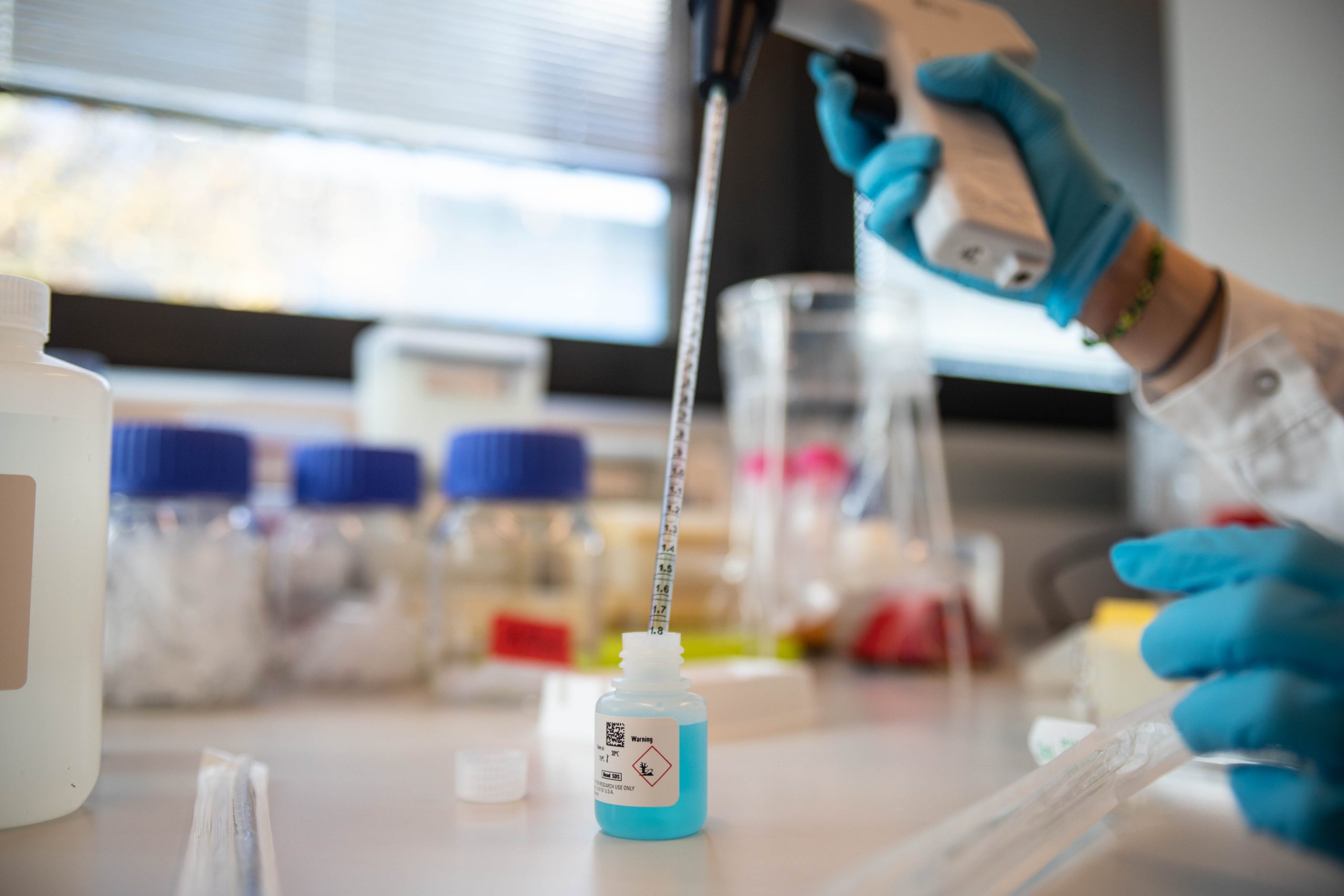The Reverse Vaccinology 2.0 technique will allow isolation of human monoclonal antibodies from convalescent patients, to develop both a cure and a future vaccine.
Rome/Siena, 26th March 2020 – In these days of global emergency due to the spread of COVID-19, the vAMRes Lab at Toscana Life Sciences (TLS) Foundation (based in Siena, Italy) has started a research project for the development of human monoclonal antibodies against coronavirus SARS-CoV-2, with the aim of using them for prophylactic/therapeutic purposes and as molecular baits for the discovery of vaccine antigens.
The project is conducted in collaboration with the Spallanzani INMI (National Institute of Infectious Diseases) Hospital, based in Rome, with which the Foundation recently signed a two-year agreement for the development of human monoclonal antibodies that can offer a rapid response to emerging infectious diseases. In particular, Spallanzani INMI contributes the renowned expertise in infectious diseases, the possibility to access clinical data from patients with COVID-19 and the ability to isolate, cultivate and characterize the pathogen.
“Since the first weeks of the epidemic, the Spallanzani Hospital has been at the forefront of the fight against COVID-19 – states the scientific director of the Institute, Giuseppe Ippolito – Our virology laboratory was among the first in the world to isolate the virus; it developed in-house diagnostic tests capable of detecting the presence of the virus before commercial tests were available and it participates in national and international clinical trials for the testing of treatment protocols. In this sense, the agreement with Toscana Life Sciences Foundation constitutes a further step, allowing us to combine the Institute’s consolidated experience in the field of emerging viruses with the ability of Toscana Life Sciences to develop monoclonal antibodies to be used also against viral infections. Our goal is: to conduct translational research, able to produce results that can be used in the short period in the health care management”.
The vAMRes Lab (Vaccines as a remedy against Anti-Microbial Resistance) of TLS Foundation started its activity in 2018 thanks to an ERC Advanced Grant of 2.5 million euros for a research project on anti-microbial resistance (focused on Neisseria gonorrhoeae and Klebsiella pneumoniae). For this reason, it has already implemented the procedure for the isolation of monoclonal antibodies that can be tested in vitro against both bacteria and viruses. The vAMRes Lab has grown quickly thanks to a Wellcome Trust funding (more than 4 million euros) for a specific project on the bacterium Shigella and, following the COVID-19 outbreak, it has added a research line dedicated to coronavirus SARS-CoV-2 within the C.Re.Me.P. (Regional Centre for Precision Medicine) Project funded by the Tuscany Region.
“Human monoclonal antibodies are safe products, already widely used in cancer therapy and approved by all regulatory agencies. Recently they have also been exploited for infectious diseases and in the case of Ebola infection they represented the first and only solution for therapy and prevention – explains Claudia Sala, ERC Senior Scientist vAMRes Lab, TLS Foundation – Furthermore, monoclonal antibodies can be developed faster than vaccines or other antiviral drugs and we believe that this timing will be further reduced as we are dealing with a virus, a very small biological entity, less complex than bacteria”.
Reverse Vaccinology 2.0[1] – The experimental approach followed by the research group is called Reverse Vaccinology 2.0, which represents the evolution of the first Reverse Vaccinology strategy optimized by Dr. Rino Rappuoli, Chief Scientist and Head External R&D of GSK Vaccines in Siena and Principal Investigator of the ERC vAMRes project at TLS Foundation. This consists in recruiting patients recovering or recovered from bacterial or viral infections and in taking their blood that is used to isolate B cells, which produce monoclonal antibodies. The latter are cloned and expressed in suitable cellular systems to be tested in vitro against the bacterial or viral species mentioned above. The tests include the evaluation of the binding of the antibody to the target bacterium or virus and the measurement of the neutralizing activity of the antibody against the same bacteria or viruses. The monoclonal antibodies isolated by this process are then subjected to molecular optimization in order to increase their affinity and/or stability. Furthermore, human monoclonal antibodies can be used as tools for the identification of new antigens to accelerate the development of vaccines against a specific pathogen (in the specific case SARS-CoV-2).
“Emerging diseases such as SARS, Ebola, Zika or Covid-19 are increasingly frequent and always find us unprepared. In cases like these, the strategic role of a centre dedicated to national biosafety is evident – states Fabrizio Landi, President of TLS Foundation – as it would be capable of developing, and perhaps even producing, rapid solutions for prevention and therapy of emerging diseases whose impact on health and on economic systems can be devastating. As a research foundation we are working precisely in this direction, with the hope of being able to join to a dedicated research group, such as the vAMRes Lab, a plant capable of producing pilot batches of monoclonal antibodies for clinical trials in humans and a sufficient number of doses for immediate interventions. Close collaboration is ongoing with all the key players in the area, in particular the Municipality of Siena and the Monte dei Paschi Foundation, in addition to the resources deriving from funds of the Tuscany Region”.
The epidemic caused by the SARS-CoV-2 Coronavirus – SARS-CoV-2 pneumonia most commonly occurs with a symptomatology characterized by fever, dry cough, sore throat and breathing difficulties. According to currently available data, the disease can have a mild course, with symptoms similar to those of common flu, or can evolve into a severe form, with the need for breathing assistance in intensive care units. Individuals with pre-existing diseases, especially respiratory, cardiovascular, metabolic (diabetes) and hepatic disorders, are more likely to develop serious clinical manifestations. The elderly are also considered to be at greater risk of severe pneumonia.
In the weeks following the announcement of the first outbreak of SARS-CoV-2 pneumonia, we have seen a steady increase in the number of cases which, on March 24 2020, reached a total of 375,498 units globally, of which 63,927 in Italy[2]. On 30 January 2020, the WHO (World Health Organization) declared COVID-19 the sixth public health emergency of international interest and on 11 March 2020 COVID-19 was declared a pandemic.
Fondazione Toscana Life Sciences (TLS) – A non-profit organization active in the regional panorama with the objective of supporting research activities in the Life Sciences and, in particular, of sustaining the development of projects from basic research to industrial application. Founded by the main institutional subjects, such as the Tuscany Region, the university, clinical and industrial world and with the significant strategic and financial contribution of the Monte dei Paschi di Siena Foundation, TLS is based in Siena, in the historic area of ”Torre Fiorentina” , where Achille Sclavo founded in 1904 the homonymous “Istituto Sieroterapico e Vaccinogeno Toscano” and where today important multinational in vaccines field strategically choose to locate the strategic R&D activities.
INMI “Lazzaro Spallanzani – Born in 1936 as an hospital for the treatment of infectious diseases, the INMI is today the national point of reference for the treatment and research on infectious diseases. Over time, the Institute’s skills have increased, adapting to the evolution of infectious diseases: from poliomyelitis to cholera, from Hepatitis to HIV, from tuberculosis to antibiotic-resistant infections, up to haemorrhagic fevers and emerging viruses. The Institute currently holds the only italian level 4 biosafety laboratory (BSL4) among international networks, and has five level 3 laboratories (BSL3), as well as a biological bank for the centralized collection and storage of key clinical samples for infectious diseases.
[1] Rappuoli et al., 2016 Journal of Experimental Medicine: https://rupress.org/jem/article/213/4/469/41936
[2] Source WHO: https://experience.arcgis.com/experience/685d0ace521648f8a5beeeee1b9125cd



